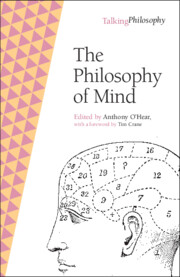Book contents
- The Philosophy of Mind
- Talking Philosophy
- The Philosophy of Mind
- Copyright page
- Contents
- Foreword
- List of Contributors
- Introduction
- The Mind–Body Problem after Fifty Years
- How to Find the Neural Correlate of Consciousness
- Embodiment and the Philosophy of Mind
- Folk Psychology and Mental Simulation
- Understanding Other Minds from the Inside
- Self-knowledge: the Wittgensteinian Legacy
- Joint Attention and the First Person
- Consciousness as Existence
- Setting Things before the Mind
- Perceptual Intentionality, Attention and Consciousness
- Experience and Reason in Perception
- Intentionality as the Mark of the Mental
- Intentionality and Interpretation
- Externalism and Norms
- Mind, World and Value
- Mind, Knowledge and Reality: Themes from Kant
- The Modality of Freedom
- Dualism in Action
- Index
How to Find the Neural Correlate of Consciousness
Published online by Cambridge University Press: 19 May 2022
- The Philosophy of Mind
- Talking Philosophy
- The Philosophy of Mind
- Copyright page
- Contents
- Foreword
- List of Contributors
- Introduction
- The Mind–Body Problem after Fifty Years
- How to Find the Neural Correlate of Consciousness
- Embodiment and the Philosophy of Mind
- Folk Psychology and Mental Simulation
- Understanding Other Minds from the Inside
- Self-knowledge: the Wittgensteinian Legacy
- Joint Attention and the First Person
- Consciousness as Existence
- Setting Things before the Mind
- Perceptual Intentionality, Attention and Consciousness
- Experience and Reason in Perception
- Intentionality as the Mark of the Mental
- Intentionality and Interpretation
- Externalism and Norms
- Mind, World and Value
- Mind, Knowledge and Reality: Themes from Kant
- The Modality of Freedom
- Dualism in Action
- Index
Summary
There are two concepts of consciousness that are easy to confuse with one another, access-consciousness and phenomenal consciousness. However, just as the concepts of water and H2O are different concepts of the same thing, so the two concepts of consciousness may come to the same thing in the brain. The focus of this paper is on the problems that arise when these two concepts of consciousness are conflated. I will argue that John Searle’s reasoning about the function of consciousness goes wrong because he conflates the two senses. And Francis Crick and Christof Koch fall afoul of the ambiguity in arguing that visual area V1 is not part of the neural correlate of consciousness. Crick and Koch’s work raises issues that suggest that these two concepts of consciousness may have different (though overlapping) neural correlates – despite Crick and Koch’s implicit rejection of this idea.
- Type
- Chapter
- Information
- The Philosophy of Mind , pp. 34 - 52Publisher: Cambridge University PressPrint publication year: 2022

